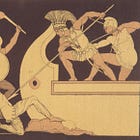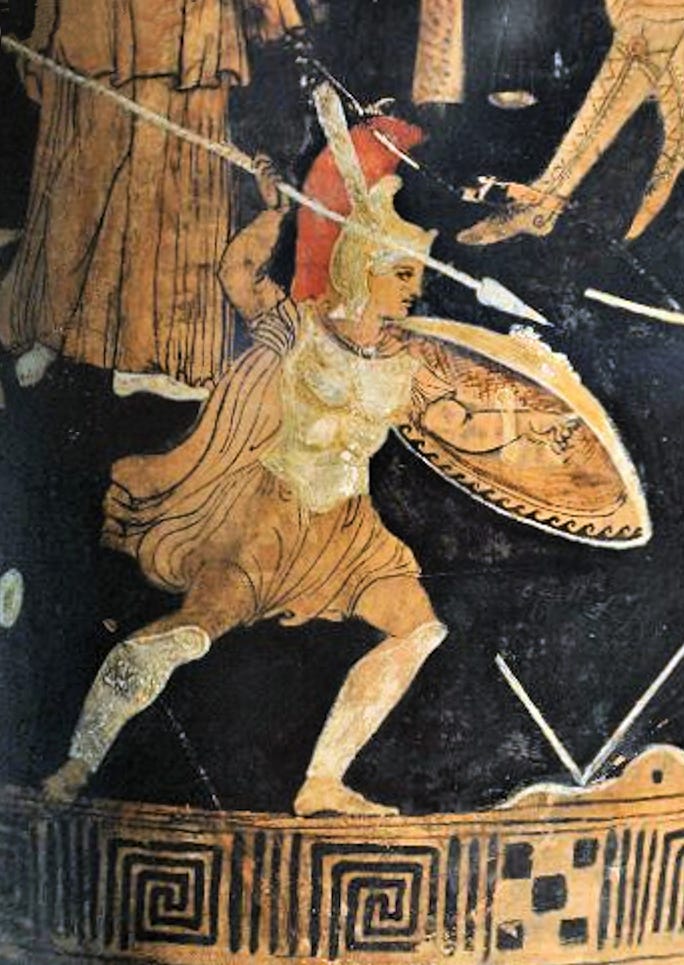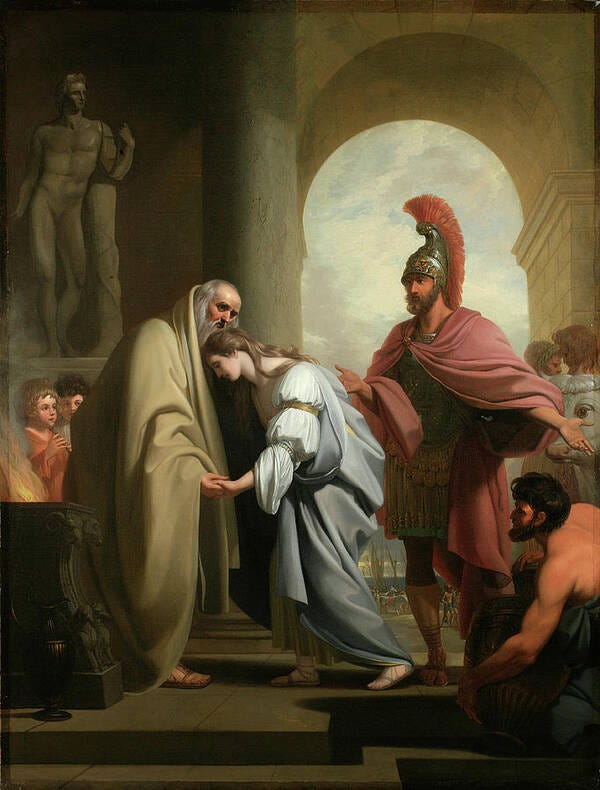Exploring Life and Literature.
*Regular essays appear on Tuesdays and Book Club essays on Fridays.*
Rage—Goddess, sing the rage of Peleus’ son Achilles, murderous, doomed, that cost the Achaeans countless losses
Dear friends,
Thus begins the epic tale of The Iliad, our literary home for the next few months. This unforgettable invocation of the poet calling upon the Muse shapes the focus of all to come. Achilles's rage shapes the fate of heroes and gods alike. In this opening book, we are immersed in the volatile tension between the hero Achilles and Agamemnon, king of Mycenae and commander of the Achaean forces. Homer introduces us to this tale's central conflict while laying the groundwork for exploring pride, honor, and the complex relationship between humans and the divine.
Unlike modern writers, Homer tells us from the beginning what this story is all about. The word used for rage is mēnis (μηνις), which typically refers to the anger of gods, and so we discover that Achilles is filled with superhuman rage. This is the divine anger we find in all the ancient narratives in which entire nations are destroyed by fire, flood, and famine. Homer’s placement of mēnis as this poem’s opening word gives notice to us that this will be the common thread through all that is to come.
When the story begins, we are already nine years into the Trojan War. The Achaeans have sacked a Trojan town, capturing the maidens Chryseis and Briseis. Agamemnon and Achilles claim the maidens as their prizes. Chryseis' father begs for her return, which Agamemnon refuses. Spurned, Chryseis’ father prays to Apollo for help.
Apollo sends a plague upon the Achaean army, resulting in many deaths. The Achaean commanders assemble and consult the soothsayer, Calchas, who informs Agamemnon that this plague is a result of his failure to return the girl to her father. A proud and arrogant man, Agamemnon agrees to return the maiden only if he is given Achilles’ prize, Briseis, in compensation for his loss.

Once Chryseis returns to her father, the plague is lifted, which should be good for the Achaeans. However, the fight between Agamemnon and Achilles is only beginning, and it is about to get worse. Achilles calls upon his mother, the sea nymph Thetis, and asks her to plead with Zeus for assistance in this matter. As this first book closes, we witness a scene on Mount Olympus where the gods discuss the war but fail to reach a consensus. Zeus tends to agree with Thetis, but he is afraid of his wife, Hera (who is also his sister).
At last, when the sun's fiery light had set, each immortal went to rest in his own house, the splendid high halls Hephaestus built for each with all his craft and cunning, the famous crippled Smith. And Olympian Zeus the lord of lightening went to his own bed where he had always lain when welcome sleep came on him. There he climbed and there he slept and by his side lay Hera the Queen, the goddess of the golden throne.
Homer provides few descriptive details of the two young maidens who play such an important part in this opening book, yet artists over the centuries have been intrigued by them. The Byzantine poet John Tzetzes described Briseis as,
"tall and white, her hair was black and curly;
she had beautiful breasts and cheeks and nose; she was,
also, well-behaved:
her smile was bright, her eyebrows big"
- Antehomerica 356-358Chryseis and Briseis highlight how women in The Iliad often serve as catalysts for male action, their fates tied to the themes of honor, loyalty, and conflict in the Greek heroic code. Both women have become enduring symbols of the collateral suffering of war. Their treatment as spoils of war and bargaining tools exposes women's vulnerability during wartime. Their stories also highlight the vulnerability of women in a male-dominated heroic culture, yet their emotional responses and relationships add layers of humanity to the epic.
Later mythological writings mention Chryseis, often as a figure associated with her father, Chryses, and Apollo. However, these texts do not elaborate on her individual story. The focus remains on her role as a priest’s daughter and the instigator of the plague sent by Apollo, making her significant in the events that set the tone for the Greek army's struggles. Some versions of her story name her Astynome, implying that Chryseis, her name in The Iliad, could be a title referring to her father (Chryses). While Homer leaves her ultimate fate ambiguous, other traditions suggest her father freed her and she returned to her home, maintaining her status as a loyal daughter.
Chryseis appears in Roman and later medieval sources that revisit the Trojan War. These narratives typically amplify her role as a symbol of divine justice (Apollo's wrath) rather than her personal story. The story of her father, Chryses, pleading with Agamemnon, became a focal point in moral tales, emphasizing humility and reverence for the gods. Renaissance artists often depicted Chryseis in scenes where her father begs Agamemnon or where the Greeks take her from their camp. These works frequently explore themes of pity and power dynamics. An example is Claude Lorrain’s painting Chryseis Returning to Her Father, which portrays her liberation as a moment of poignant relief, echoing the human cost of war.
In The Iliad, Briseis becomes a symbol of Achilles’ honor and pride rather than being a character with significant agency. Briseis’ role in The Iliad emphasizes her lament for Patroclus and Achilles, highlighting her emotional depth in the story’s later books. This laments her as more than a war prize, subtly illustrating the personal toll of the Trojan War. Later writers expand Briseis’ narrative, sometimes portraying her as deeply in love with Achilles. For example, the Posthomerica by Quintus of Smyrna, which covers events after The Iliad, portrays her mourning Achilles' death with intense grief. In some traditions, Briseis returns to her homeland after Achilles’ death, her fate left uncertain but colored by sorrow for the losses she endured.
Briseis appears in medieval and Renaissance retellings of Trojan myths, often romanticized as Achilles’ lover. These interpretations add depth to her relationship with Achilles, portraying it as mutual rather than one-sided or forced. Giovanni Boccaccio, in De Mulieribus Claris (On Famous Women), writes a moralized account of Briseis, emphasizing her as a figure of beauty and misfortune. In Quintus of Smyrna's Posthomerica (3rd century CE), Briseis' grief over Achilles' death is elaborated upon. She laments the loss of the man she came to care for, adding a layer of tragedy to her character. This portrayal contributes to a growing narrative of Briseis as a figure of pathos rather than merely a spoil of war. Although Geoffrey Chaucer’s Troilus and Criseyde is not directly about Briseis, this poem draws from the Trojan War mythology to explore the emotional lives of characters caught in love and war, a thematic descendant of Briseis’ story.
During the Renaissance, Briseis often appeared as a romanticized lover of Achilles. Writers during the Renaissance expanded her story, adding a mutual affection between Briseis and Achilles, making her a symbol of tragic love. This interpretation often aimed to humanize Achilles, showing his capacity for tenderness. In 18th- and 19th-century art, Briseis is depicted in dramatic moments, such as her removal from Achilles' tent by Agamemnon's emissaries. For instance, François-Léon Benouville’s Achilles Receiving the Envoys of Agamemnon shows Briseis as a passive but emotionally charged figure, emphasizing her vulnerability. Other works, like Henry Fuseli’s Briseis Led Away from Achilles, highlight her as a symbol of Achilles’ wounded pride and the personal cost of the epic’s conflicts.
For a modern interpretation of this story, look no further than Pat Barker’s The Silence of the Girls. This novel reimagines Briseis’ story from her own perspective, giving her a voice to recount the horrors and indignities she suffered as a captive. Barker portrays her as resilient and complex, critiquing the glorification of war and the erasure of women’s voices in epic tales. Also, in Madeline Miller’s The Song of Achilles, Briseis plays a supportive role, depicted as a friend and companion to Patroclus. This version casts her as a figure of dignity and strength.
Despite their relatively minor roles in The Iliad, both women have evolved into powerful symbols of war’s toll on the vulnerable, erased voices, and ambiguity in love and captivity.
What parallels can we draw between the story so far and our lives? I see a few different threads that we could explore.
The power of emotions. This story is all about rage. Rage is a level of anger so intense and uncontrolled that it takes over us. We lose ourselves in the powerful rush of adrenaline coursing through our veins. Our minds become animalistic and we are taken back to our base instincts. In this first book, we only get a glimpse of what is to come later in the story but we can already see the groundwork being laid. Can you think of a time when your emotions got the best of you?
Ego and jealousy. Agamemnon believes he deserves the best of everything and becomes jealous when his prize is taken away. How often in our lives do we let our ego interfere with the greater good? How often do we become jealous of others who have something we desire? Ego and jealousy are counterproductive to interior harmony and detrimental to interpersonal relationships. Are there times when you allow your ego or jealousy to get in the way?
The role of the divine. The ancients prayed to their deities when they felt wronged or desired something beyond their reach in much the same way that many people seek guidance or assistance from the divine today. Humanity has always needed something bigger than themselves, the ultimate parental figure, to run to and feel comforted by in times of need. The Greek pantheon involved themselves perhaps a little too much in the daily lives of people, at least according to the stories. When, if ever, do we look to our gods?
Finally, I found a bit of humor in this first book as well. All the humans are arguing about different things and then they run to their “parents”, in this case the deities, begging to get what they want. The “parents” argue amongst themselves, particular Zeus and Hera, over what the right course of action is. This happens today as well. Siblings argue and run to mom and dad. If mom and dad are not on the same page then conflict arises and what started as a simple sibling disagreement can create an entire household that is walking on eggshells. Not much has changed since ancient times.
Reading Assignment for Next Week
We will cover Book 2. In the Fagles translation, this chapter is entitled The Great Gathering of Armies and covers pages 99-127. In the Wilson translation, it is called The Multitude and covers pages 25-55.
Beyond the Bookshelf is a reader-supported publication. If you are looking for ways to support Beyond the Bookshelf, please visit my support page and see the ways you can help continue the mission of exploring the connection between life and literature.
Until next time,











Disclaimer: I'm not an historian of the English language; I'm a literature scholar with twelve graduate hours of study in Old and Middle English. I know just enough about etymology and the old Philology to be dangerous. What follows is an educated guess--that's all.
-----
There's this old theory--it's largely abandoned now and I don't know exactly why--once held by Old Testament scholars that the Philistines were Greeks who'd been blown off course on their return from Troy in the same weather system that created the occasion for Homer's 'Odyssey.' In the early 2000s I studied with Daniel Master, then a freshly minted Harvard Ph.D. in Archaeology, who, despite being very young, had by then had the opportunity to head the dig at Ashkelon, a major Philistine city during the period covered by the OT book of Judges. At that point Master was studying amphorae and armor to investigate the theory. Also, the opening stanza of 'Sir Gawain and the Green Knight,' begins, "When the siege and the assault had ceased at Troy/ And the fortress fell in flame to firebrands and ashes," (trans. Tolkien 23) and recounts the founding of Britain by Brutus (the Roman). These two phenomena suggest there was a great deal more mobility in the ancient world than we tend (or at least, than I once tended) to assume.
This morning, after reading your post, Matthew, I chased down an intuition I've had for a while: our English word "kill" came from the story of Achilles. After all, if in the 1200s the 'Gawain'-poet was writing about Brutus and the founding of Rome (see Virgil's 'Aeneid') and making reference to the fall of Troy, it's likely that he was familiar with the story of the wrath of Achilles. And as Tolkien believed, every word is a story. So why couldn't "kill" be a truncated reference to Achilles or his behavior?
There's no etymological silver bullet--some words are just lost to the aeons of the past--but following the philosopher Roderick Chisolm, we might say there's at least "some proposition in favor" of the thesis that "kill" came from "Achilles." Consider the following from the Oxford English Dictionary (OED):
"kill" Etymology:
"If in Old English, its type would be *cyllan, conjecturally referred to an Old Germanic *kuljan, ablaut-variant of *kwaljan, whence Old English cwellan to quell v.1; but the original sense is against this. Known first in Layamon, and in southern texts, in form cüllen, küllen. In midland dialect normally kille(n), kill, the common form in Middle English; kelle is rare. The usual Scots form in 15–16th cent. was kele, keill, the vowel of which is difficult to account for. In Middle English the past tense and past participle varied between killed and kild; exceptionally the participle appears as kilt (compare spilt), now regarded as an Irishism, and sometimes used jocularly, especially in sense 6b."
The theory that "kill" comes from some lost Germanic word is complicated by the original sense of "quell" (if I'm reading this rightly), but if we look at the range of meaning for "quell" Achilles's deeds fit: "to put to death; to strike so as to kill"; "to strike down"; "to cause roots to die off or wither"; "to crush, overcome, subdue, oppress, or reduce to submission or silence"; "to put an end to; to extinguish"; "to diminish, abate, fail, or bring to nothing."
Not only does Achilles kill Hector, he "strikes" Hector "down," as it were, dragging Hector's body through Troy's dust. There's a ton of language in 'Iliad' referring to the city, it's culture, or its people as a tree, and thus to Aeneas as a "scion."
The structures of the various proto forms of "quell" are also interesting. Although the c in "cyllan" is sometimes exchanged for a k in later forms, it's noteworthy that earlier forms tend to include the c, which would have been associated with the Greek chi, "x." In ancient Greek, "Achilles" was spelled Ἀχιλλεύς--there's no kappa here; and kappa is normally the Greek letter that shows up as a k in English when English borrows from Greek. It's also worth noting that older forms of "quell" included an ending syllable--"cyllan," "cwellan," "cüllen"--and this syllable hung on even in some later forms: "kille," "kele," "kele." To some extent, we could write this off as a structural feature of Old English and Germanic (OE was a largely Germanic language) verbs, which had these endings and modified them to reveal the sense, case, of a given use of the verb in-text. But these later spellings preserve the ending e well into the late 1300s--long after English would have been Frenchified by the Norman Invasion (the Normans were Franks who invaded the at Hastings in 1066) and the old Germanic pronunciations, which would have sounded the final e as "eh"--"KILLeh" would have dropped out of use, at least among the literate upper classes.
The other connection worth noting here is the Latin "aquila," "eagle." The Romans referred to their standard-bearers as "aquilifers," "bearers of the eagle," because a legion's standard bore the shape of an eagle. (Here the Wikipedia entry is helpful: https://en.wikipedia.org/wiki/Aquilifer.) Note that in Latin, "aquila" means "eagle," but is derived from "aquilus," "swarthy" or "dark." "Aquilus" connoted nobility in Rome; but its range of meaning ("swarthy," "dark") evokes terms that are commonly applied to barbarians in the ancient world. (Sound like anyone you know from 'Iliad'?) The literal sense "eagle" was commonly associated with Zeus/Jupiter, as we see in 'Iliad,' who sent the eagle as a bird-sign of impending doom.
So then: were the Roman "aquilifers" a glorification of the wrath of Achilles, the culler, the metaphorical eagle whose presence on the battlefield portended the wrath of Zeus? It certainly fits. And finally, since we see that "quell" entered southern dialects of English, which is where the Romans, like the Saxons and Franks after them, invaded and settled, it's at least worth imagining that this image of Achilles was imported to England and became, over a millennium, our word "kill."
-----
To the extent this (semi-educated) guess is correct, our language is still haunted by the War at Troy, folks. Trauma begets trauma begets trauma; and humanity does not easily forget.
I was interested in the parallel between Nestor trying to counsel Achilles and Agamemnon, and Hephaestus trying to make peace between Zeus and Hera, with all the reasonable advice falling on deaf ears.